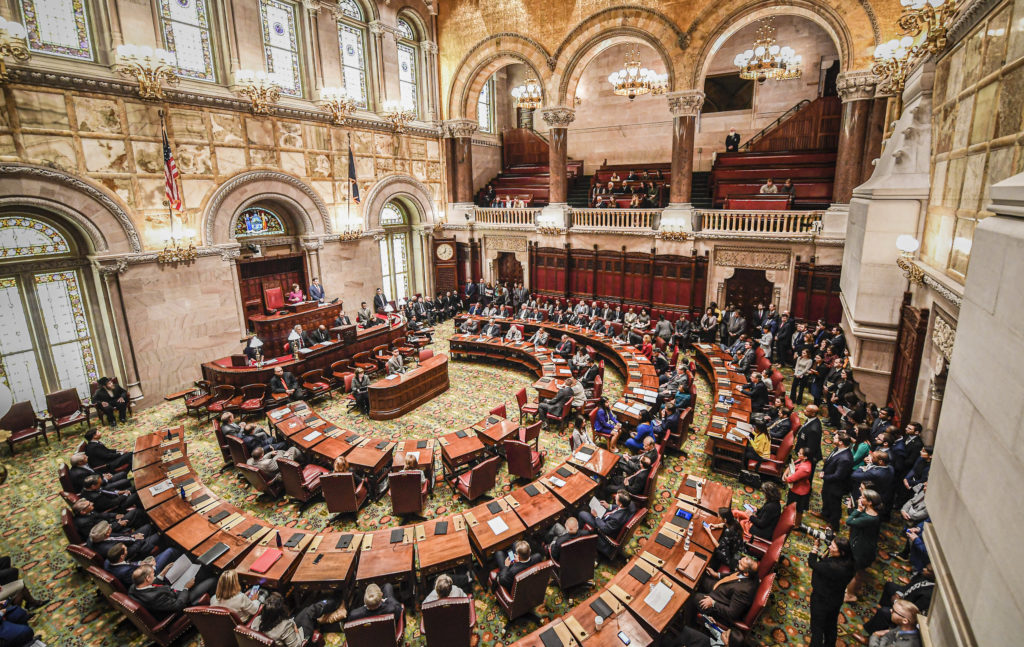The Legislative Session in Albany has begun, and our elected Members of the Assembly and State Senate are back at work. On the first day of session, over 900 bills, resolutions, enactments, permits, requirements and other pieces of legislation have been proposed, keeping the gears of the State government churning along. There are three states that had major legislation proposed or passed in 2022 that New York can learn from to help the state become better for families.
Louisiana
Act 440 went into effect on January 1st in Lousiana. While this may not have gotten much national coverage, it changes the way pornography is disseminated on the internet.
The law aims to require age verification on pornographic websites, preventing children under the age of 18 from accessing pornography. The largest sites have complied with the law, while other sites shut down because they could not implement the law in the state.
“This law had bipartisan support and passed almost unanimously in both the House & Senate with close to 50 co-authors, including Democrats and Republicans,” tweeted Rep. Laurie SchlegelTuesday. “It was not a Republican win but a win for children in Louisiana. This bill is about protecting children not limiting adults.”
As multiple studies have shown, porn addiction inhibits brain development and contributes to depression, anxiety, and other forms of emotional and mental illness. All other forms of pornography, from print to video, have age restrictions, except the internet. Yet the internet is not above age restriction technology. Gambling sites are required by law to verify ages before use. These is literally no reason why similar laws cannot be passed in every state and on the federal level.
Arizona
HB 2853 was passed and signed in Arizona in the middle of 2022. It is the most expansive school choice program in the country. The reasoning is simple. The money that is allocated per student is given to the student, not to a specific school. This allows parents to choose which school they want their child to go to.

New York has been one of the toughest states to get real school choice bills passed, as the teacher’s union in the state, especially the Board of Education in New York City, support Democratic candidates for elections. Yet this perpetuates the myth that vouchers or other school choice programs drain funding from public schools
According to the Federation for Children white paper on the subject, “Private school choice programs save our government millions of dollars each year. When a student attends a non-public school using a voucher, ESA, or tax credit scholarship, state and federal governments usually do not have to pay a public school to provide an education for that student. And the cost to educate a child in a traditional district school is almost always greater than the public funding provided for each child in a school choice program. So it’s no wonder that tax credit scholarship programs, for example, end up saving each participating state anywhere from $13-$120 million annually.”
School choice is also supported by a bipartisan voters and legislators around the country. According to a 2018 national poll of likely voters,72% of Latinos, 61% of whites, 66% of African Americans, 75% of Republicans, 62% of Independents, and 54% of Democrats support school choice.
Tennessee
This is the least likely legislation to be adopted in New York State, and is also the one that is most necessary. One of the first bills filed for the 2023 legislative session is the “Protecting Children from Gender Mutilation Act.” This act seeks to ban medical interference that “alters a child’s hormonal balance and procedures that remove their organs to enable the minor to identify as a gender different from their biological sex.” This would enable civil cases by children against parents who consented to these procedures, and a $25,000 penalty for violation of the act.
Given the trend in child mutilation surgeries around the nation, including tacit endorsements of the procedure by the Biden administration, this is a necessary act that protects children from the social contagion of transgenderism. Many transgender people themselves, like Blair White, emphasize this common sense law, as these decisions should not be made by someone who is not legally an adult.
Radical body changes are against the law already in New York. Drinking, smoking, and getting tattoos require age limits. As does buying a gun or driving. A 16 year old can’t buy a scratch off lottery ticket, but can get a double mastectomy or castration.
The New York State Legislature can make moves toward these common sense actions, and they would receive strong bipartisan support throughout the state. Yet they are opposed by the most radical Leftwing of the Democratic party, so it’s doubtful they would even be brought up for a vote.




